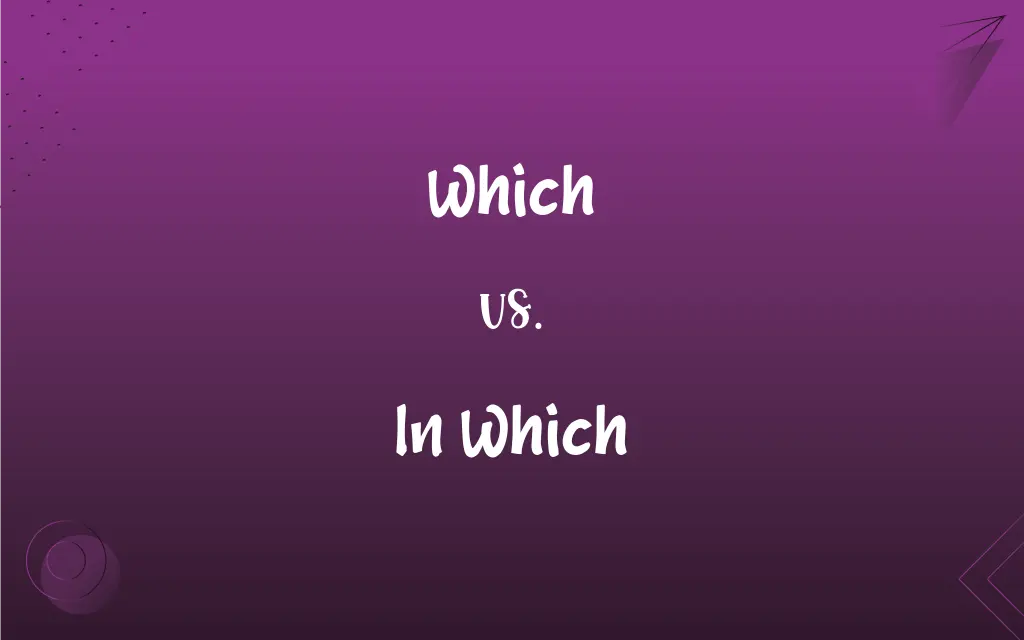Which vs. In Which: What's the Difference?
Edited by Aimie Carlson || By Harlon Moss || Published on February 10, 2024
"Which" is used to introduce a relative clause identifying something mentioned, while "in which" introduces a clause specifying the context or situation of a previously mentioned subject.

Key Differences
"Which" is versatile, used in questions and relative clauses to refer to one or more items from a defined set. "In which" is more specific, often used to introduce clauses where "which" refers to a place, time, or situation. For example, "Choose the color which you like," vs. "The era in which he lived was tumultuous."
"Which" connects relative clauses to nouns or pronouns, providing more information about them. "In which" typically starts adverbial clauses, adding context about the circumstances or environment related to the previous statement. Example: "This is the book which inspired me," vs. "This is the house in which he grew up."
"Which" can ask questions or provide additional details about a noun. "In which" is used to refer to circumstances or specific conditions within a broader context. For instance, "The method which he used was effective," vs. "The period in which they lived was marked by change."
"Which" is straightforward and suits both formal and informal contexts. "In which" is more formal and often found in written, academic, or professional discourse. Example: "The strategy which he chose was successful," versus "The situation in which we find ourselves requires careful analysis."
Comparison Chart
Usage
Introduces relative clauses, referring to nouns or entire sentences.
Introduces clauses focusing on situations or conditions within a context.
ADVERTISEMENT
Function
Can be interrogative or relative, providing details or asking about a specific part of a set.
Specifies a context, often temporal or situational, for the proceeding statement.
Grammatical Role
Acts as a relative pronoun.
Functions as a prepositional phrase.
Context
Common in both spoken and written English, versatile in formal and informal settings.
More formal, often used in written or academic contexts.
Example Usage
"The book which you read," (detailing about the book).
"The era in which he lived," (describing the circumstances of the era).
Which and In Which Definitions
Which
Used to introduce a clause giving more information about something mentioned earlier in the sentence.
He failed the test, which surprised everyone.
ADVERTISEMENT
In Which
Refers to a specific time period or moment.
1984 was a year in which many important events occurred.
Which
Used in questions to ask about one or more items from a known set.
Which dress do you prefer?
In Which
Used to specify the particular conditions or circumstances.
He told the story, in which he was a hero.
Which
Introduces non-restrictive clauses, providing additional information that is not essential to the meaning of the sentence.
The car, which was red, sped past us.
In Which
Introduces a clause in a formal or academic context.
The theory, in which he proposes a new model, is controversial.
Which
Used to indicate a choice or distinction between different options.
Choose which color you like best.
In Which
Indicates the place or setting of an action or event.
This is the room in which the meeting took place.
Which
Used to refer back to an entire preceding sentence or idea.
She didn’t turn up, which was unexpected.
In Which
Specifies the situation or context relating to the main clause.
They had an argument, in which many truths were revealed.
Which
What particular one or ones of a number of things or people
Which part of town do you mean?.
Which
Any one or any number of; whichever
Use which door you please.
FAQs
What is "which" used for?
"Which" is used to introduce relative clauses, providing more information about a subject or object in a sentence.
Is "in which" more formal than "which"?
Generally, yes. "In which" tends to appear in more formal or academic writing.
Can "which" be used in questions?
Yes, "which" is often used in interrogative sentences to ask about a specific part of a known set.
Is "which" formal or informal?
"Which" is neutral and can be used in both formal and informal contexts.
What is "in which" used for?
"In which" is used to introduce clauses that provide context or background, often about time, place, or situation.
Does "in which" always indicate a location?
Not always. It can refer to time, situation, or context as well as location.
Is "in which" used in everyday conversation?
Less frequently; it's more common in written or formal contexts.
Does "in which" change the meaning of a sentence?
"In which" adds context and can change how the information in a sentence is understood.
Can "which" refer to an entire previous sentence?
Yes, "which" can refer back to the content or idea of an entire preceding sentence.
Can "which" introduce non-essential information?
Yes, "which" often introduces non-restrictive clauses, adding extra, non-essential information.
Can "which" have multiple antecedents?
Yes, "which" can refer back to more than one noun in a sentence.
Is "which" used in restrictive clauses?
Yes, "which" can be used in both restrictive and non-restrictive clauses.
Can "which" be omitted in informal speech?
Sometimes, especially in informal speech, "which" can be omitted if the meaning remains clear.
Is "which" always followed by a verb?
Usually, but it can be followed by a noun if it's part of a prepositional phrase.
Can "which" and "in which" be used interchangeably?
No, they serve different grammatical and contextual functions.
Can "in which" start a sentence?
It's uncommon but can happen, especially in formal writing.
Does "in which" always follow a noun?
Typically, it follows a noun or a clause referring to a noun.
Can "which" be replaced with "that"?
In restrictive clauses, yes, but not in non-restrictive clauses.
Is "in which" interchangeable with "where"?
Sometimes, especially when referring to location, but not always.
Does "in which" require a specific antecedent?
Yes, "in which" usually refers back to a specific noun or idea mentioned earlier.
About Author
Written by
Harlon MossHarlon is a seasoned quality moderator and accomplished content writer for Difference Wiki. An alumnus of the prestigious University of California, he earned his degree in Computer Science. Leveraging his academic background, Harlon brings a meticulous and informed perspective to his work, ensuring content accuracy and excellence.
Edited by
Aimie CarlsonAimie Carlson, holding a master's degree in English literature, is a fervent English language enthusiast. She lends her writing talents to Difference Wiki, a prominent website that specializes in comparisons, offering readers insightful analyses that both captivate and inform.































































